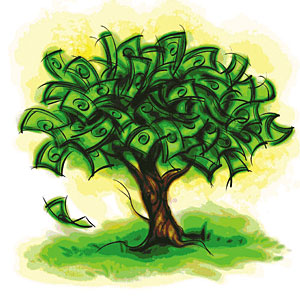 |
Sunday 5 June is World Environment Day, and to mark it there will be a rush to organise neighbourhood cleaning campaigns, tree plantations and numerous seminars and conferences. But hanging the 'green' tag needs to go beyond 5 June, it has to be year-round way to thinking. Sustainable lifestyles and an ecological consciousness doesn't just save the planet, it also makes business sense. Being ecological is economical.
The best way to do this is to promote green jobs: work opportunities that explore ways to preserve and restore the environment and at the same time are economically viable. Green jobs offer a hybrid solution to address problem of unemployment and environment sustainability, linking the twin goals of reducing poverty and protecting the environment.
The transition to a low-carbon economy presents employment opportunities by opening new markets, and by stimulating eco-innovation and investment in more efficient production techniques. Prospects for creating green jobs can be developed in entirely new ideas or in finding ways in which the existing businesses can be made environmentally friendly.
The power crisis in Nepal is hurting the economy, but could have the unintended side benefit of spurring the manufacture of alternate energy systems. Investment in the solar industry has seen tremendous growth in the last few years as people began to seek alternative renewable sources of energy for their homes and workplace. Necessity becomes the mother of invention, and helps the economy over the long run.
Green businesses can inspire innovation not just in energy sources, but also construction, transportation and agriculture. The green job industry is growing in Nepal with people exploring environment-friendly business ideas. For example, organic farming is catching up, with even restaurants showing off organic vegetables, fruits and coffee in their menus. Recycling is another sector where investments can be made, as done by Jamarko, a paper recycling company.
Job opportunities can also be developed in helping people design green buildings and technologies. The regular 'Green Scene' section of Nepali Times profiles such green business ideas that actually working.
The green tag can be useful in attracting customers, but more importantly can help a business become cost effective. Being green focuses on cutting consumption of raw materials and energy, and production of waste through high-efficiency strategies, which in turn increase productivity and decrease cost. Even a simple change such as replacing the bulbs with CFLs, and installing solar panels, can help a business cut electricity bills. Such practices also help the business become socially responsible.
Last month the Ministry of Labour and Transportation and the International Labour Organisation (ILO) organised a national conference on 'Climate Change and Green Jobs' in which plans to make government policies support green jobs were discussed.
The Geneva-based ILO began its Green Jobs Program in 2008 and has worked in several countries in the Asia-Pacific region including India, Bangladesh, China, Thailand, Philippines and is now launching the initiative in Nepal.
The need now is to help develop manpower with entrepreneurial skills as well as technical know-how for green jobs. The private sector can take a lead in 'greening' its practices and move beyond tokenism.
As a ratifier of the Kyoto Protocol and for being part of Reducing Emissions from Deforestation and Forest Degradation (REDD) and the Clean Energy Development Path, the government has to play its part in facilitating green jobs. It needs to encourage investments in environment-friendly practices with clear policies that support and reward� sustainable economic activities (and penalise those that aren't). Green jobs promise triple return in form of sustainable enterprises: poverty reduction, and economic development.



